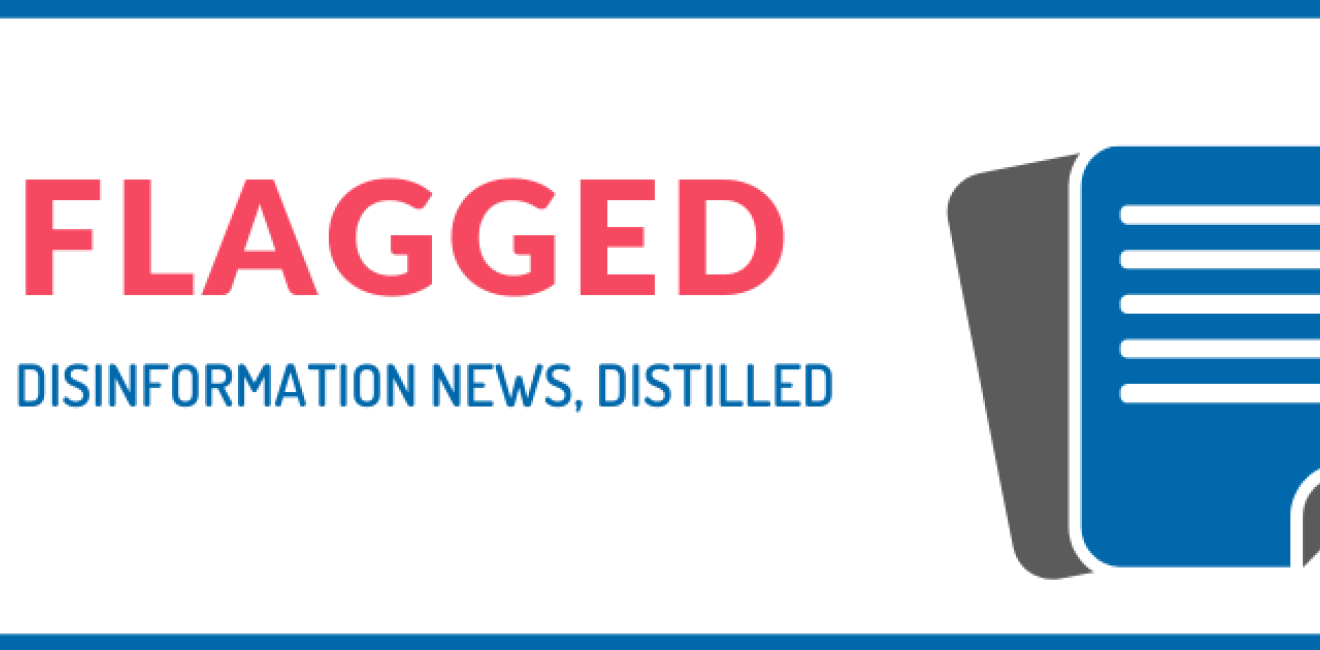Welcome to a final preview of Flagged, a newsletter from the Wilson Center’s Science and Technology Innovation Program. Each week, we flag the most important news about disinformation and how to counter it, landing an accessible analytical brief in your inbox every Wednesday.
Information flows are incessant; news fatigue is real. In addressing these issues, nothing matters more than the laws and policies that govern our information space. Amid the COVID-19 “infodemic,” the choices our legislatures and social media platforms make could have repercussions for years to come. And we’ll be tracking and making sense of them for you. Stay in the know; if you'd like to start receiving Flagged, please opt-in here.
This Week in Disinformation: Zoom complies to Chinese government pressure; EU accuses China of waging a disinformation campaign; Biden issues rebuke of Facebook; Russians’ speech suffers under “anti-virus” fake news provisions.
-
For the first time, E.U. officials publicly accused China of waging a coordinated disinformation campaign against European member states. China stands accused of pushing disinformation about the coronavirus pandemic in an effort to sow division among European allies and distrust in democratic institutions. The E.U. has typically avoided expressing outright criticism of China's handling of the coronavirus outbreak and watered down reporting on its COVID-19-related disinformation activities for fears of retribution upon Chinese foreign direct investments in Europe. The E.U.'s acknowledgement came the day before Twitter took action, shutting down a Chinese disinformation network composed of 173,750 accounts. This network was responsible for disseminating propaganda about China’s response to the coronavirus and promoting Chinese state-sponsored media and officials on Twitter. China's Ministry of Foreign Affairs spokeswoman Hua Chungying responded to the takedowns by claiming that China is the largest victim of disinformation and that Twitter should instead focus its efforts on eliminating accounts part of disinformation campaigns targeting China.
-
In addition to disinformation abroad, China is engaging in censorship at home. Zoom admitted to complying to Chinese government requests to shut down three video conference events commemorating the anniversary of Tiananmen Square and covering the status of democracy in Hong Kong, as well as to deactivate three accounts of the US and Hong Kong-based pro-democracy activists hosting them. Zoom claims that it is obligated "to comply with local law" and adhere to government requests for blocking discussion of topics considered illegal in China for mainland Chinese participants. A spokesperson for Zoom explained, “It is not in Zoom’s power to change the laws of governments opposed to free speech." Zoom does not have the capability to remove individual participants within a video conference call or to block users based on IP address location. Thus, the company opted to shut down these events due to the presence of viewers from mainland China and terminated the accounts of the event hosts based outside of mainland China.
-
Zoom admitted fault in its decision and later reinstated the accounts, promising to not let Chinese government requests impact users outside of China again going forward. To comply more appropriately in the future, Zoom plans to build its capabilities to block users based on geography. Zoom’s decision making marks another example of an American technology company bending to the CCP’s censorship regime, extending China's rules beyond its borders and stifling users' free expression in exchange for access to the Chinese market. Compliance with authoritarian regimes’ takedown requests has become an alarming trend in the tech sector, with companies such as LinkedIn, Apple, and Twitter working with governments to maintain an in-country presence.
-
Meanwhile, Russian authorities have issued a flood of prosecutions for citizens spreading false information about coronavirus online. The prosecutions have targeted ordinary citizens who propagate rumors and conspiracy theories, as well as those that criticize the government's response to the pandemic. The prosecutions are for violations of Russia's “fake news law,” which was passed in March 2019 and outlawed information that "exhibits blatant disrespect" for Russian society and government. As part of an "anti-virus" bill package hastily sent through Parliament this March, the Duma added provisions to the “fake news” law that vastly expanded the punishments for violations to include steep fines and up to five years of jail time in effort to contain discussion of coronavirus. This move was compounded by Russia's Supreme Court ruling in April that fake news discussion about coronavirus is also illegal. Russian authorities have subsequently ramped up efforts in response to the pandemic, establishing a fake news division of Russia's coronavirus task force and launching investigations into coronavirus conversations on messaging applications. Experts and advocates of free expression believe the crackdown may encourage Russian citizens to self-censor and refrain from posting about the pandemic or other government criticism altogether.
-
Democratic Presidential nominee Joe Biden submitted an open letter to Facebook CEO Mark Zuckerberg that outlined several recommendations on political ad policies and fact checking practices to help reign in misinformation polluting the platform ahead of the election. The recommendations included: limiting the amplification of false content; issuing fact-checks on election content that goes viral; applying clear rules that apply to all users regardless of their status; and running preliminary fact checks on all political ads in the two weeks leading up to an election. The letter came a week after Zuckerberg experienced significant pressure from Facebook employees to follow Twitter's recent decision to issue a fact check on a misleading tweet by President Trump, with employees arguing that this would hold the President accountable to the same community standards applied to all its users. Zuckerberg continues to maintain that Facebook is not the “arbiter of truth” and should not fact check politicians. Facebook responded to Biden's open letter, explaining that President Trump's recent executive order targeting the safe harbor status provided for internet platforms is directly at odds with the suggestions outlined in the letter. "The people’s elected representatives should set the rules, and we will follow them," the statement read
-
Breaking: On Wednesday morning, the platform announced it would allow users to opt-out of political or issue-based ads ahead of the 2020 election.
Recent Wilson Center Work
-
Facebook Groups are becoming a significant vector for disinformation, write Nina Jankowicz, the Wilson Center’s Disinformation Fellow, and Cindy Otis, a former CIA Analyst in a new piece in WIRED. In order to mitigate the problem, Jankowicz and Otis suggest increasing transparency around Group ownership and management and limiting privacy settings on large Groups.
-
Disinformation Fellow Nina Jankowicz will launch her book How to Lose the Information War: Russia, Fake News, and the Future of Conflict in a live webcast on July 9. She’ll be joined by the Director of the Kennan Institute, Matt Rojanksy, and Senior Lecturer at Yale University Jackson Institute for Global Affairs, Asha Rangappa, to discuss the book and her research. How to Lose the Information War reports from the front lines of the information war in Central and Eastern Europe on five governments' responses to disinformation campaigns. It journeys into the campaigns the Russian and domestic operatives run, and shows how we can better understand the motivations behind these attacks and how to beat them. Above all, this book shows what is at stake: the future of civil discourse and democracy, and the value of truth itself.
-
Angela Stent, former Director for Russia on the U.S. National Security Council and author of Putin's World: Russia Against the West and with the Rest wrote of the book: “In this wide-ranging and sobering account of Russian information operations in Europe and the United States, Nina Jankowicz sounds a clear warning: unless politicians reassess their campaign tactics and seek to diminish, rather than exacerbate, the fissures that exist within their own societies, the West will remain vulnerable to domestic and foreign groups seeking to undermine democracy.” RSVP here to get the latest updates.









